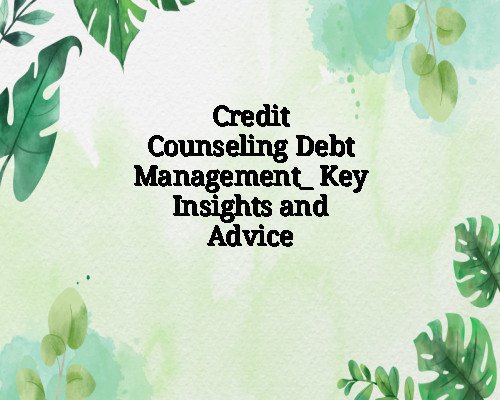Credit Counseling Debt Management: Key Insights and Advice
Debt management can feel overwhelming, but with the right guidance, it’s possible to regain control of your finances. One of the most effective ways to manage debt is through credit counseling and debt management programs. These services provide a roadmap to help individuals reduce their debt load and work toward financial stability. In this article, we will delve into the essentials of credit counseling and debt management, how they work, and the key advice that can help individuals navigate their financial challenges.
Credit counseling and debt management programs are often confused, but they serve distinct roles in managing debt. Credit counseling involves consulting with a certified financial counselor to assess your financial situation and develop a personalized plan for managing your debts. Debt management, on the other hand, is a structured repayment plan where a credit counselor works with your creditors to consolidate your debts into a single monthly payment.
Understanding these services and how they work can help individuals make informed decisions about their finances and take the necessary steps toward becoming debt-free.
What is Credit Counseling?
Credit counseling is a service offered by nonprofit organizations to help individuals gain a clearer understanding of their finances, identify the root causes of their debt, and develop strategies to improve their financial situation. Credit counseling is typically available for individuals who are struggling with credit card debt, medical bills, personal loans, or other forms of unsecured debt.
A certified credit counselor will evaluate your income, expenses, and debts to provide you with tailored advice on how to manage your finances more effectively. The goal is to create a plan that will help you pay down your debt while avoiding bankruptcy or severe credit damage.
Key Benefits of Credit Counseling
-
Financial Education: Counselors educate you on budgeting, saving, and managing debt effectively.
-
Debt Reduction Strategies: Counselors help develop strategies to reduce interest rates, lower monthly payments, or consolidate your debt.
-
Personalized Solutions: Credit counseling is customized to your specific financial situation.
-
Nonjudgmental Support: Counselors provide emotional support during difficult financial times without passing judgment on your past spending choices.
What is Debt Management?
Debt management refers to a structured repayment plan facilitated by credit counseling agencies. It is often a solution for people who are unable to manage multiple credit accounts due to high-interest rates or multiple debts. Debt management consolidates all unsecured debts into one monthly payment, often at a reduced interest rate. This type of program is beneficial for individuals who are looking for relief but do not want to pursue more drastic measures like bankruptcy.
When you enroll in a debt management program, the credit counselor will negotiate with your creditors on your behalf. This can result in lower interest rates, waived fees, and an easier-to-manage repayment plan. The ultimate goal of debt management is to help you repay your debt in full while avoiding unnecessary penalties or fees.
Key Benefits of Debt Management
-
Simplified Payments: Combining all your debts into a single monthly payment makes managing finances easier.
-
Lower Interest Rates: Credit counselors can often negotiate lower interest rates on your behalf.
-
Avoid Bankruptcy: Debt management is a viable alternative to bankruptcy for those struggling to pay off debts.
-
Better Credit Score: By following a debt management plan and paying down debt, you can improve your credit score over time.
How Does Credit Counseling and Debt Management Work?
The process of enrolling in credit counseling and participating in a debt management program typically follows a structured path. Here’s how it generally works:
1. Initial Consultation with a Credit Counselor
The first step is to meet with a certified credit counselor. During this consultation, you will provide details about your financial situation, including income, expenses, and debt. The counselor will assess your financial condition and discuss potential solutions based on your needs.
2. Debt Management Plan (DMP) Development
If the counselor determines that a debt management plan is suitable for your situation, they will develop a plan to help you repay your debts. This may involve negotiating with creditors for lower interest rates or reduced fees, consolidating payments, and establishing a timeline for repayment.
3. Enrollment in a Debt Management Program
Once a plan is created, you’ll enroll in the program. The credit counseling agency will handle payments to your creditors, and you will send one monthly payment to the agency. The agency will then distribute the payments to your creditors on your behalf. Most programs take anywhere from three to five years to complete, depending on the amount of debt and the terms of the plan.
4. Ongoing Support and Monitoring
During the duration of the debt management plan, your credit counselor will monitor your progress and offer guidance when needed. They can help you stay on track, adjust the plan if necessary, and provide support for any new financial challenges that arise.
Advice for Those Considering Credit Counseling and Debt Management
If you’re considering credit counseling and debt management, it’s important to approach these services with careful thought and consideration. Here are some key pieces of advice for those thinking about these options:
1. Research Nonprofit Agencies
When choosing a credit counseling agency, be sure to select a reputable, nonprofit organization. The U.S. Department of Justice maintains a list of approved credit counseling agencies, so start by reviewing these organizations. You can also check if the agency is accredited by the Council on Accreditation (COA).
2. Know the Costs
While many credit counseling services are low-cost or free, some agencies charge fees for their services, especially if they’re offering a debt management plan. Ensure you understand the fees upfront and evaluate if the costs are reasonable for the services provided.
3. Avoid Scams
Unfortunately, there are some dishonest agencies that prey on vulnerable individuals struggling with debt. Be cautious of any organization that promises quick fixes or demands large upfront fees. Always verify the legitimacy of an agency before proceeding with any services.
4. Be Honest About Your Finances
To get the most out of credit counseling, be open and transparent with your counselor about your financial situation. Accurate information is essential for creating a debt management plan that suits your needs.
5. Commit to the Plan
Debt management plans require commitment and discipline. To succeed, you’ll need to stick to the agreed-upon payment schedule and make adjustments to your spending habits. The more seriously you take the plan, the sooner you will achieve financial freedom.
6. Consider All Your Options
Credit counseling and debt management may not be the best fit for everyone. If your debt load is very high or you’re facing other significant financial challenges, bankruptcy or other debt-relief solutions might be more appropriate. It’s important to explore all available options and choose the one that best aligns with your long-term financial goals.
When to Consider Credit Counseling and Debt Management
Credit counseling and debt management may be appropriate in the following situations:
-
You’re struggling to keep up with monthly payments on credit cards or loans.
-
You’ve received multiple calls from creditors seeking repayment.
-
Your debt is overwhelming, and you need help creating a structured repayment plan.
-
You’re unable to lower your interest rates or resolve disputes with creditors on your own.
-
You want to avoid filing for bankruptcy but need assistance getting back on track.
Conclusion
Credit counseling and debt management offer valuable tools for individuals who are struggling with debt and want to take proactive steps toward financial recovery. By working with a certified credit counselor, you can develop a clear, structured plan for managing your debt and avoiding the long-term consequences of missed payments or bankruptcy.
Understanding the differences between credit counseling and debt management programs is crucial to making informed decisions about your finances. With the right support and commitment, you can navigate the path to debt freedom and secure a brighter financial future.

